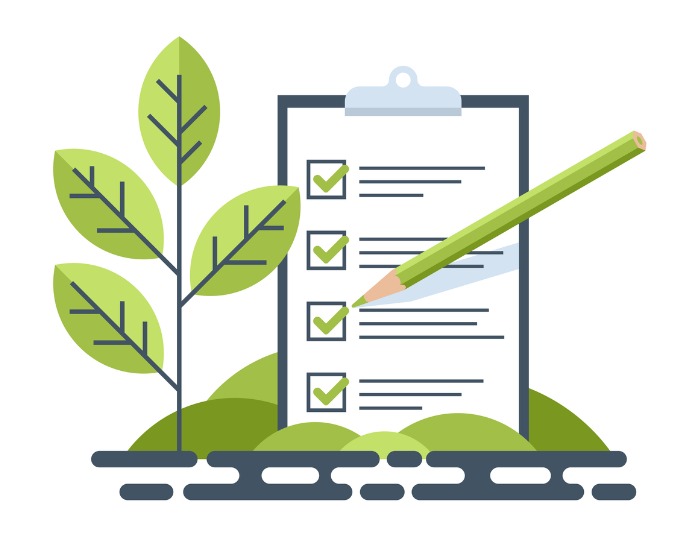Table of Contents
Table of Contents
- What is a landscaping quality control checklist?
- Why is it important to have a quality control checklist for landscaping?
- How to create a landscaping quality control checklist
- Streamline your quality control with a landscaping checklist template
- The advantages of using a landscaping checklist template
- Download your template now
- Benefits of using landscaping software for quality control
- Try Aspire for efficient landscaping quality control
Landscaping customers want their properties to be aesthetically pleasing but also functional, safe, and sustainable.
Checking the boxes on a landscape quality control checklist ensures every customer gets what they want with service that exceeds expectations.
What is a landscaping quality control checklist?
A landscaping quality control checklist documents the full scope of a landscaping project, outlining the specifics of:
Landscaping tasks
Standards
Procedures
Your landscaping crew will have detailed instructions to ensure every project:
✔ Meets the desired quality standards
✔ Adheres to safety and environmental regulations
✔ Satisfies the client's specific needs
The quality of each final product—its design, functionality, and aesthetics—depends on the procedures your landscaping company follows to ensure complete customer satisfaction.
Why is it important to have a quality control checklist for landscaping?
Implementing quality control measures ensures the delivery of high-caliber results by helping crews meet the standards and specifications of your brand.
Improving quality control also helps owners mitigate risks and reduce costs, building a solid reputation as reliable and professional landscapers.
While crews may use your quality control checklist as a landscape maintenance checklist to do the job right, facility managers can use the checklist to track crew performance, identify and take corrective actions on issues, and improve overall efficiency and effectiveness.
How a quality control checklist improves landscaping services
Quality control not only improves workflows but also contributes to your business's growth, reputation, and profitability.
Here are four key ways a quality control checklist improves landscaping services:
Ensure customer satisfaction: Quality control ensures landscaping projects meet or exceed expectations. Happy customers are more likely to refer your services, leave positive reviews, and provide repeat business that builds your customer base.
Minimize errors and service delays: Quality control helps you catch mistakes before they become significant issues to avoid costly rework, project delays, and potential damage to your reputation. This leads to smoother project execution and better customer experiences.
Utilize resources wisely: Quality control requires efficient resource management. Monitor the use of materials, labor, and equipment to prevent waste and optimize resource allocation.
Reduce costs: Effective quality control saves money by minimizing waste and preventing minor issues from escalating into costly problems. Get more landscape contract renewals by doing the job right the first time.
How to create a landscaping quality control checklist
Not sure what to include in your landscaping quality control checklist? Use the following tips to make sure yours covers every aspect.
Define checklist scope for landscaping projects
Using a quality control checklist is equally effective for homeowner landscaping projects to improve curb appeal and large commercial property projects, such as regular maintenance at shopping malls, municipal buildings, public parks, or colleges and universities.
While necessary tasks may vary, key components include:
Property assessment
Site preparation
Landscaping design
Material and plant selection
Safety compliance
To ensure quality standards are met, use a QC checklist to oversee workmanship, design compliance, cost controls, project deadlines, and complete client satisfaction.
Research local regulations and industry standards
Local jurisdictions each have specific regulations and permit requirements for performing landscaping work on particular sites. Rules for a city or county may include zoning laws, digging permits, special water usage restrictions, and more.
Incorporate tasks into your checklist to help crew leaders know which permits must be obtained before their teams perform landscaping work. After meeting regulatory compliance with local, state, and federal authorities—or even environmental agencies—add relevant guidelines to your checklist for crews to follow.
Include detailed guidelines for each landscaping task
Outline the specific steps crews must take to complete each landscaping task on a particular work order, including detailed instructions for each phase of the job, including:
Tools
Equipment
Materials
For instance, the task of selecting plants for a customer’s landscaping project may involve three or more steps, such as:
Identifying native plants for the site
Choosing a variety of plants based on color, texture, and hardiness, and
Making a list with the desired quantity and location for each species
Whether you’re working on a small horticulture project or a large-scale landscaping job with its own irrigation system, outlining the required steps for every task will help your crews meet and exceed customer expectations.
Establish quality control and inspection procedures
Who on your team is responsible for conducting quality control checks during and after landscaping projects? Typically, a project manager or on-site supervisor performs this duty, overseeing the entire landscaping project from start to finish.
Specify in your landscaping quality control checklist who performs these checks, what results to document on their checklist, and any corrective actions needed to rectify any subpar issues.
Document maintenance and post-project tasks
Once crews finish a landscaping project, the job isn’t necessarily done.
Many landscapes require regular maintenance schedules to stay in optimal condition, such as:
Watering
Fertilizing
Weeding
Outline post-project maintenance tasks in your QC checklist for every type of landscaping project, then instruct your crews to relay this detailed information to customers upon completion.
Completed checklist updates are also an excellent time to ask for customer feedback or share warranty information on the materials used for the job.
Update the checklist based on feedback and improvements
You can’t improve what you can’t measure. Use your quality control checklist to measure team performance, but regularly review your checklist and seek feedback from employees and customers on ways to improve it. The more refined your checklist, the more effective it will be.
Streamline your quality control with a landscaping checklist template
Landscapers who want to run a successful landscaping business automate their processes to focus on delivering high-quality landscaping services.
Aspire’s all-in-one landscape business management software gives landscaping and lawn care professionals the tools to operate more efficiently and effectively. Aspire minimizes mistakes and reduces the amount of time you spend on quality control with automated features to:
Improve project management
Gain real-time insight into customer and project data
Enhance the flow of communication
Standardize your landscaping quality control efforts with Aspire’s convenient and easy-to-use downloadable landscaping checklist template.
When crews follow the same standardized processes to deliver high-quality landscaping services, your company streamlines efficiency and ensures customer satisfaction on every job.
The advantages of using a landscaping checklist template
Looking for an edge over the competition? Our landscaping quality control checklist template saves time and money because it’s easy to use, can be customized to fit your specific business needs, and provides a thorough checklist that covers all relevant tasks for a particular process or project.
Download your template now
Ready to level up your quality control game? Download our free landscaping quality control checklist template today.
Benefits of using landscaping software for quality control
Using landscaping software to automate your quality control processes helps you save time, money, and effort.
Efficient task management
Aspire landscape business software empowers landscapers to streamline project management, scheduling, and tracking progress, ensuring efficient task management and quality control on every landscaping project.
Real-time inspection and reporting
With our software, landscaping business owners and project managers can conduct landscaping inspections, capture data, and generate reports in real time, facilitating quick identification and resolution of quality issues.
Analytics and performance insights
Landscapers gain access to analytics and performance insights with our landscaping software, which enables owners to make smarter decisions about the improvements they make to their processes based on real-time quality control data.
Integration with scheduling and communication
Implementing quality control measures requires good communication with your landscaping teams. Aspire integrates with scheduling and communication tools, including Gmail and Outlook, to ensure effective coordination and collaboration among managers, field crews, and your office staff.
Customer satisfaction and feedback management
Customer service is everything in the landscaping industry. Gaining new leads is often as simple as maintaining a stellar reputation.
Aspire helps business owners collect customer feedback, manage satisfaction levels, and identify areas for improvement. Simplified and integrated communication shows customers your brand is committed to continuous quality control.
Try Aspire for efficient landscaping quality control
Aspire’s landscape management software provides a comprehensive solution for streamlining quality control processes, enhancing efficiency, and delivering high-quality landscaping services. Schedule a free demo today to experience the benefits firsthand.











